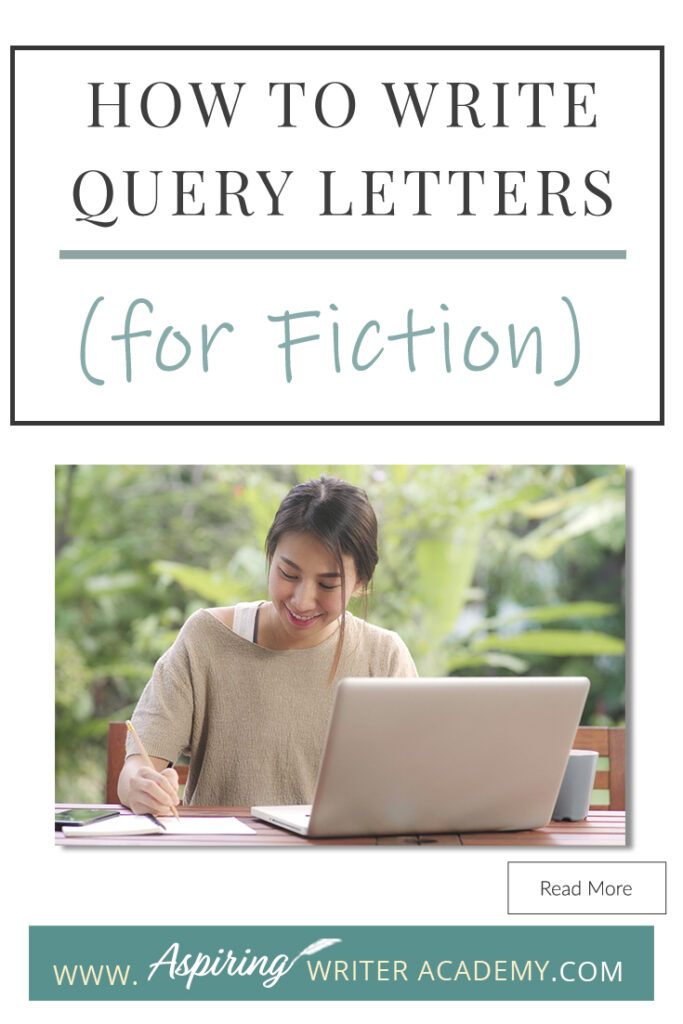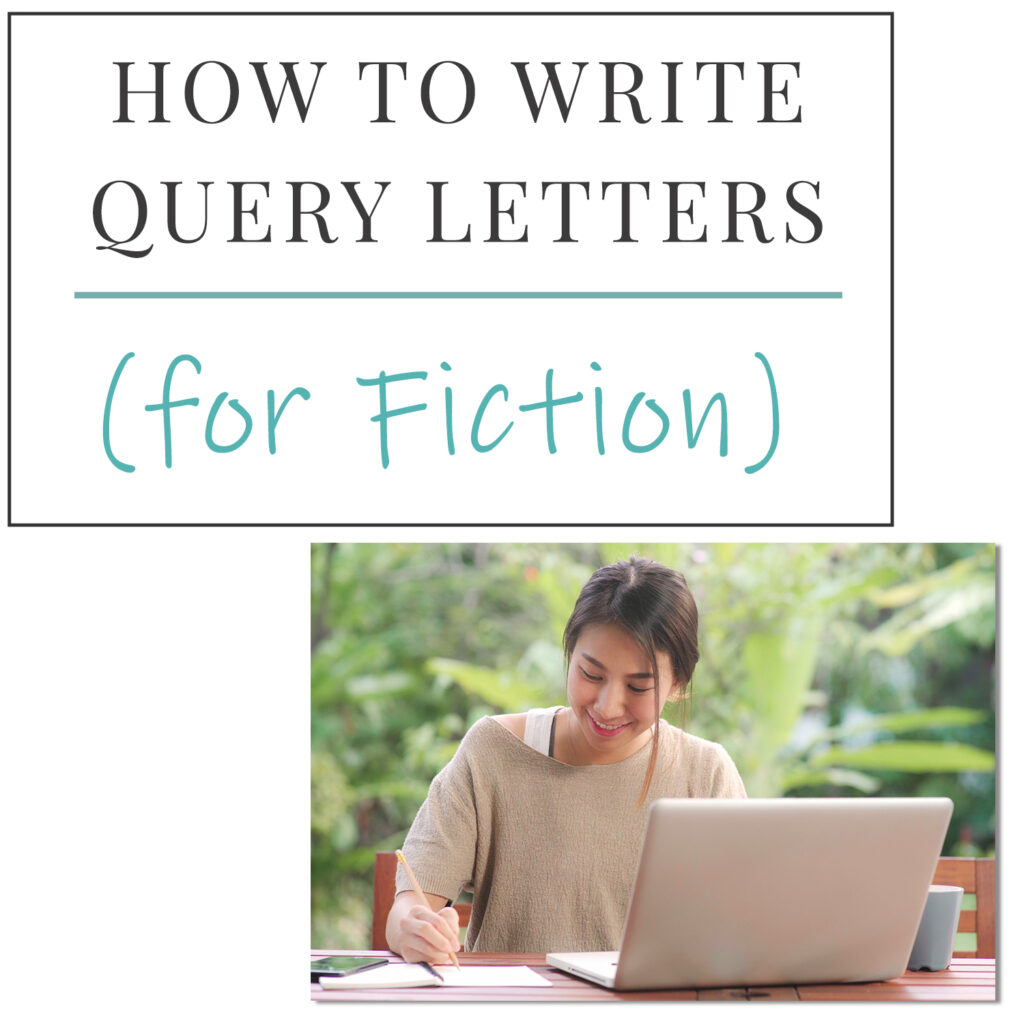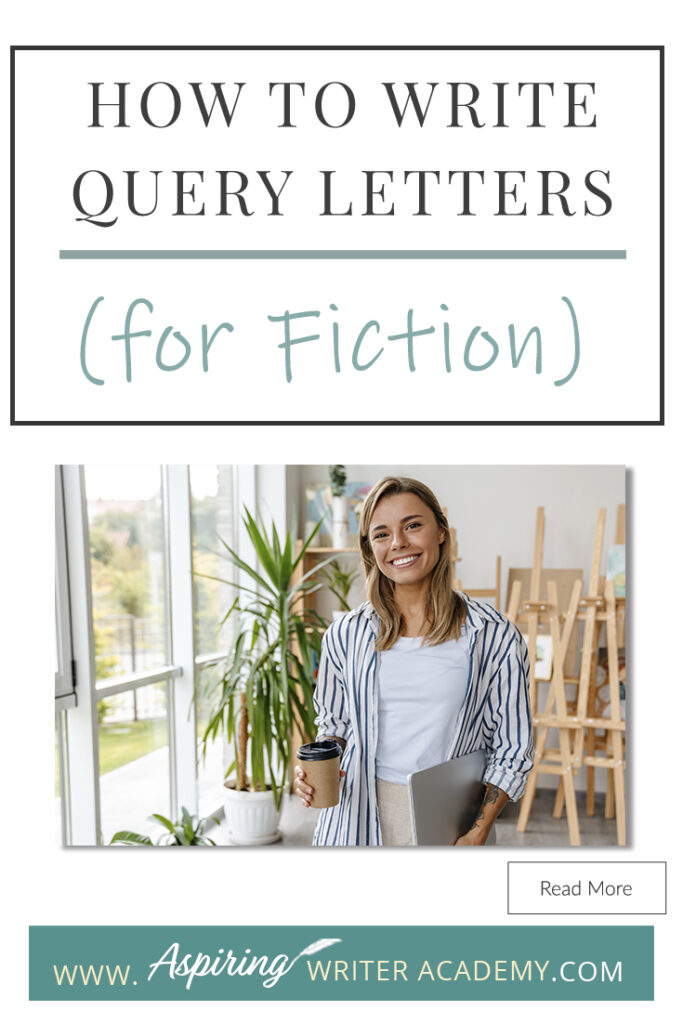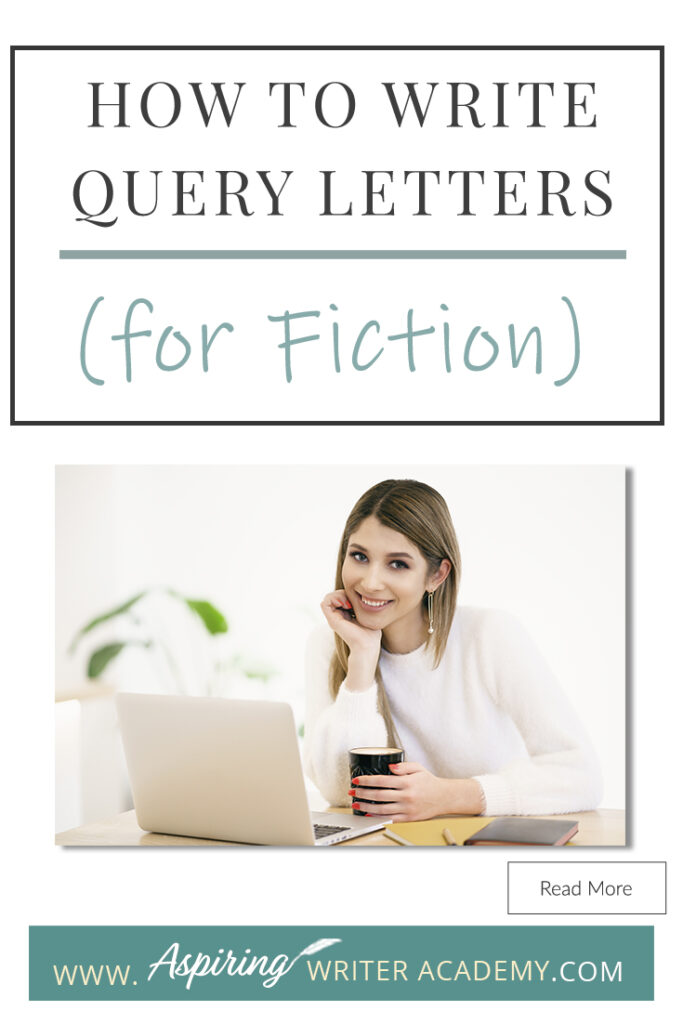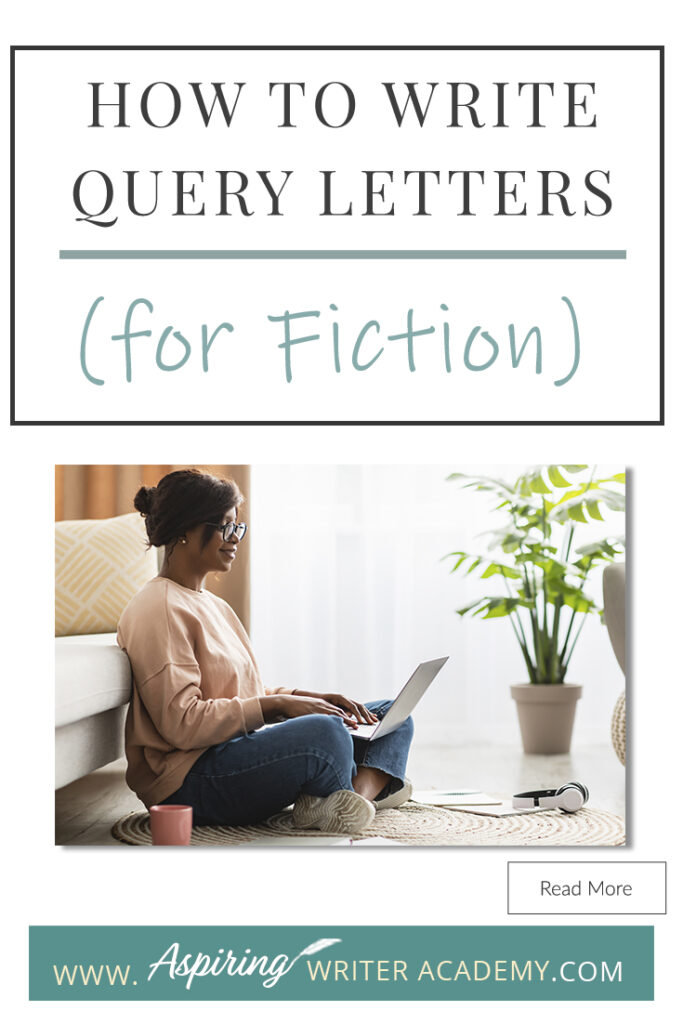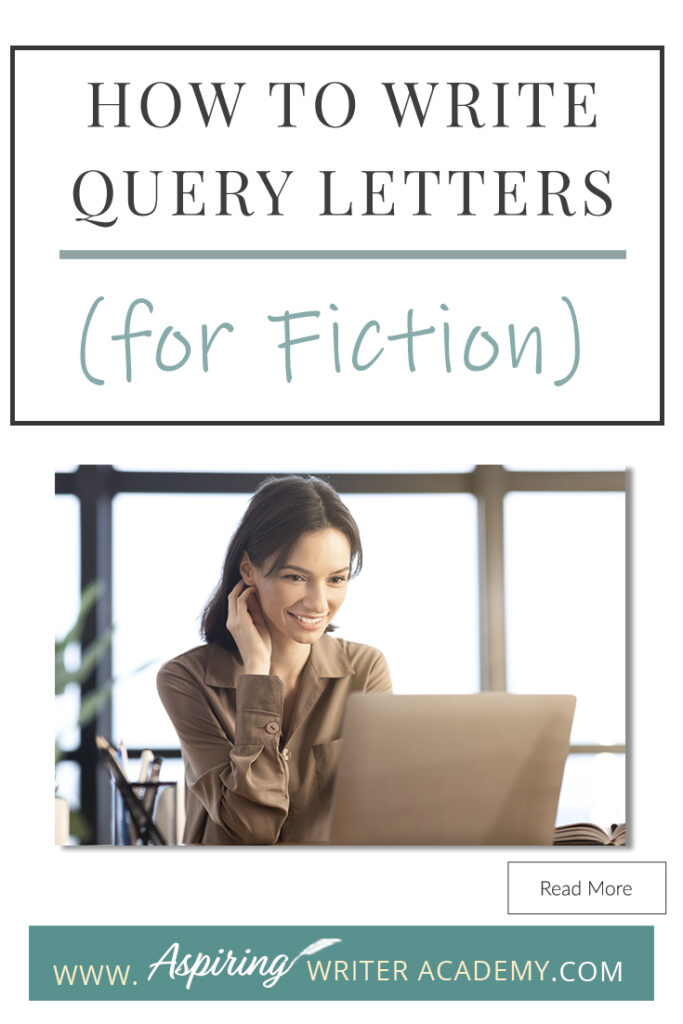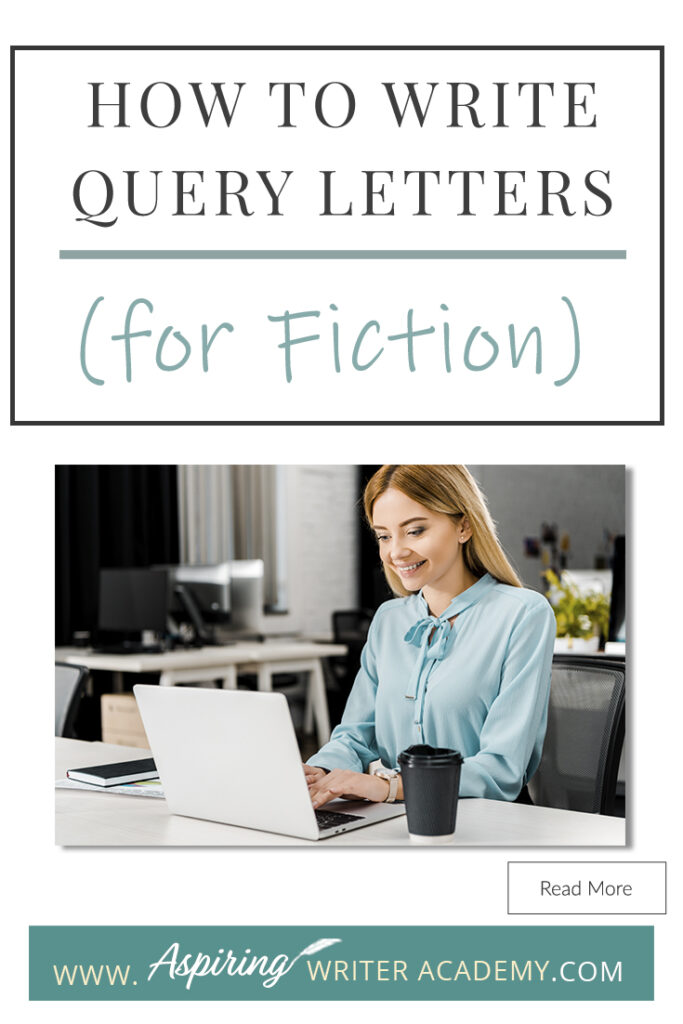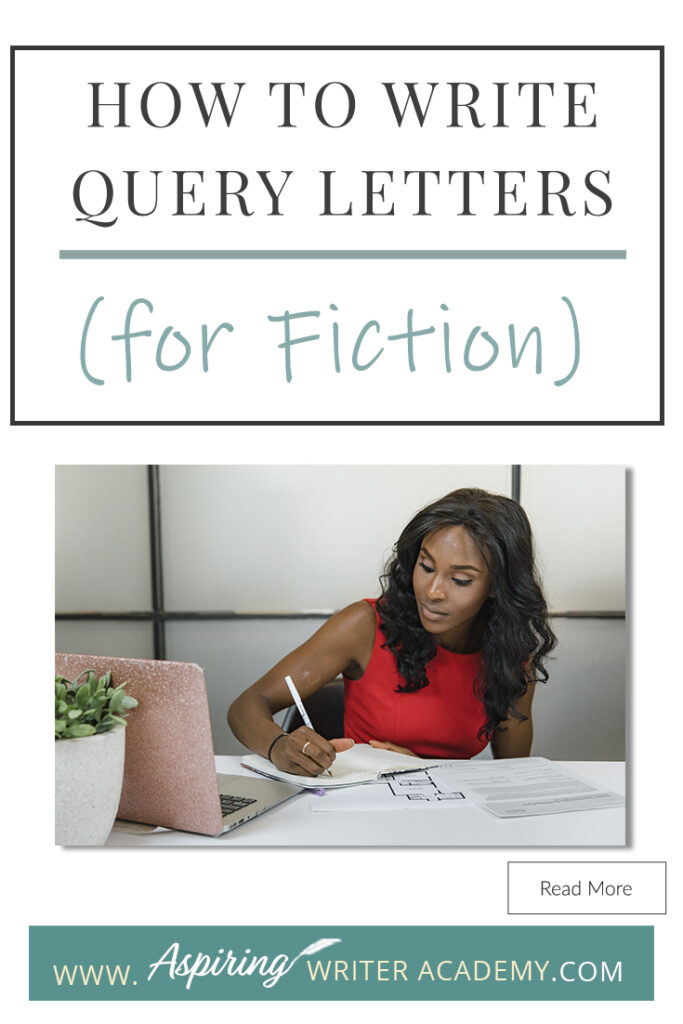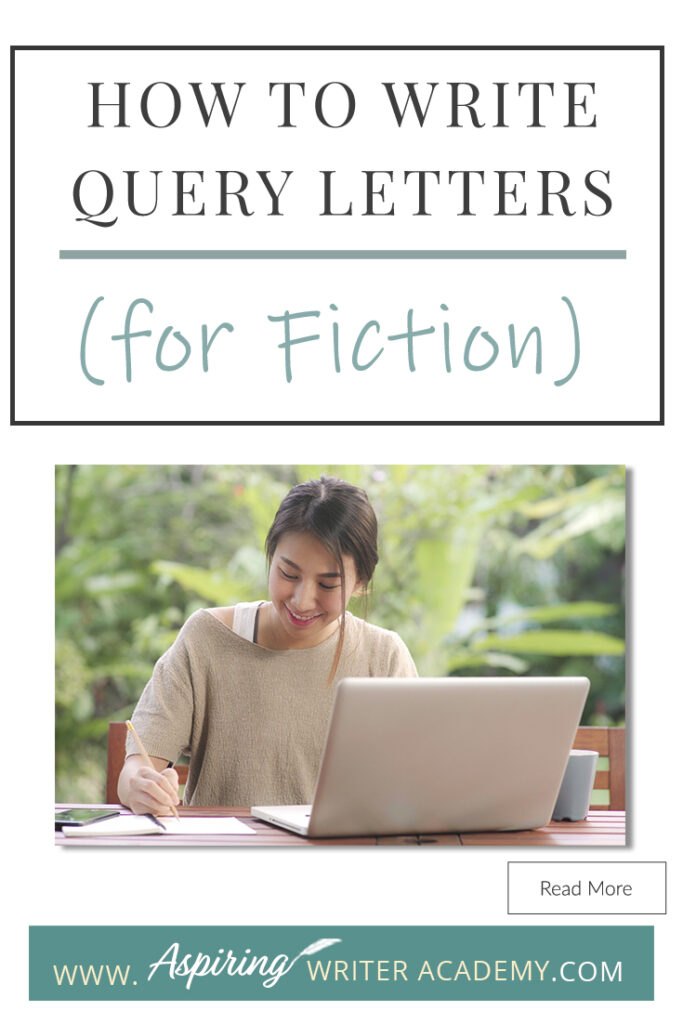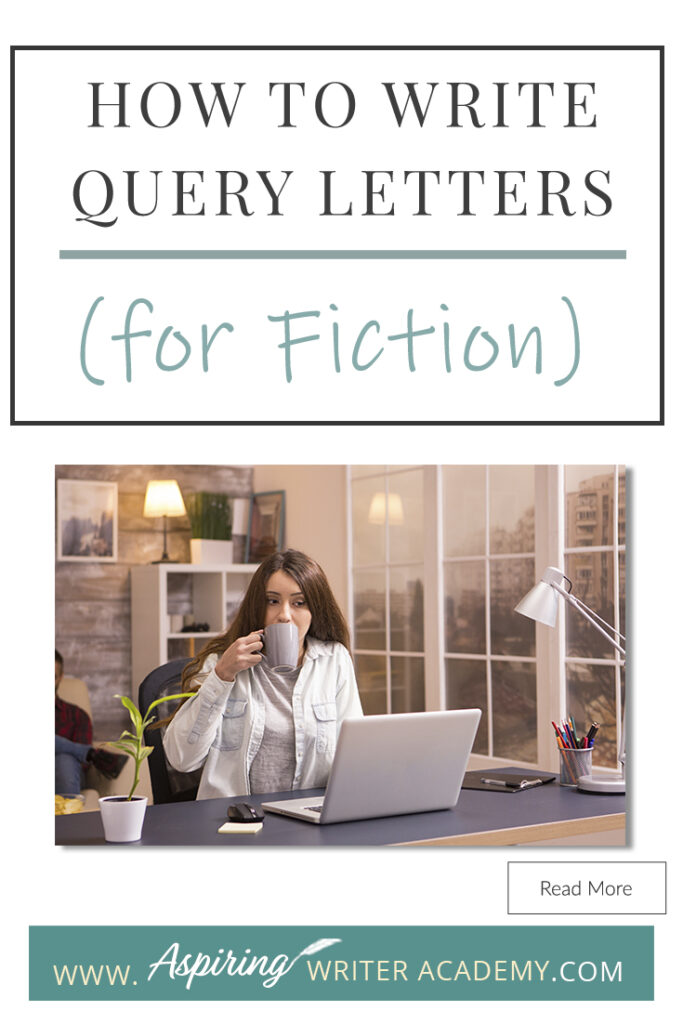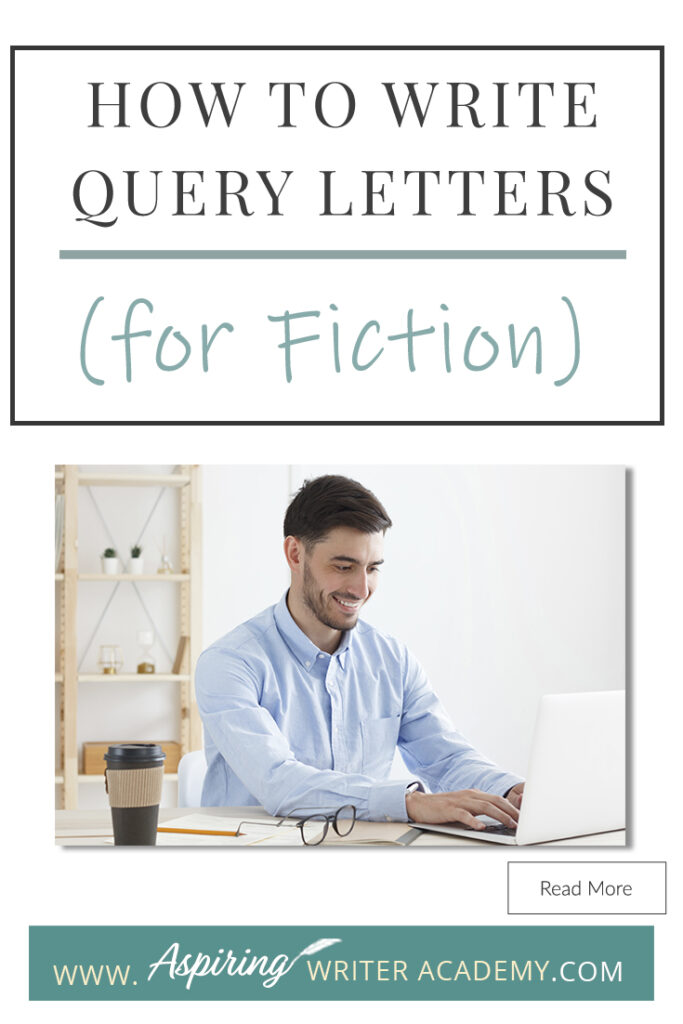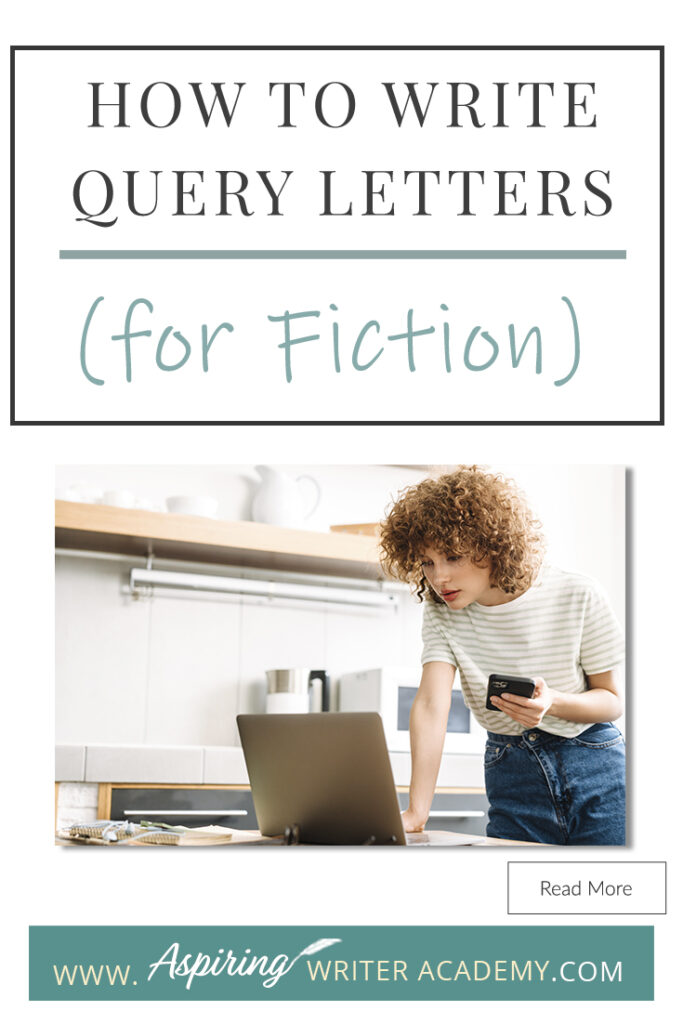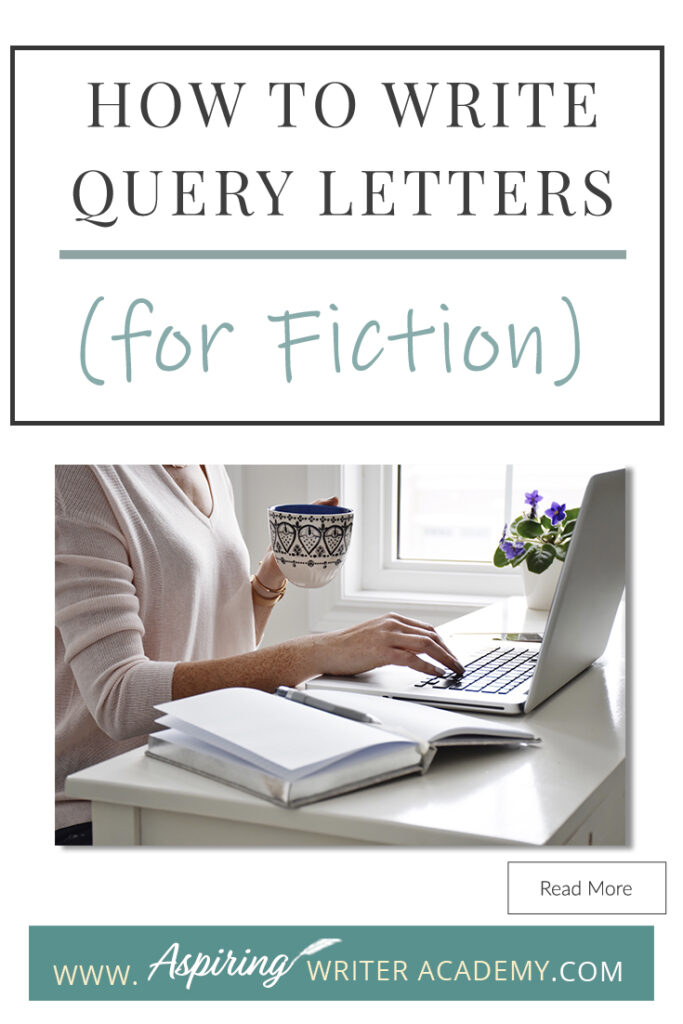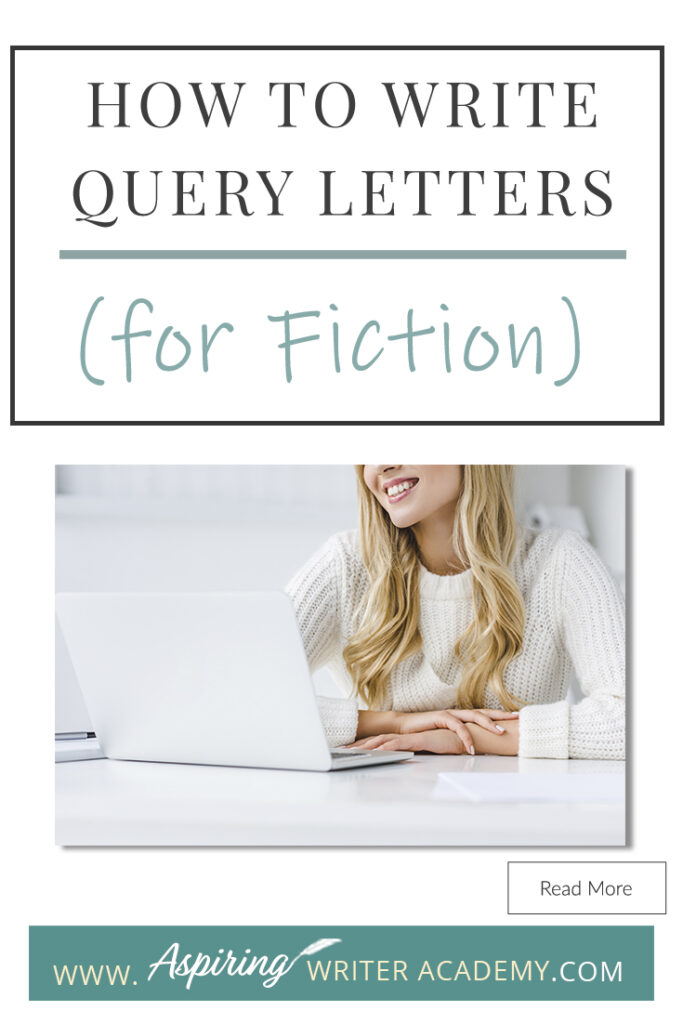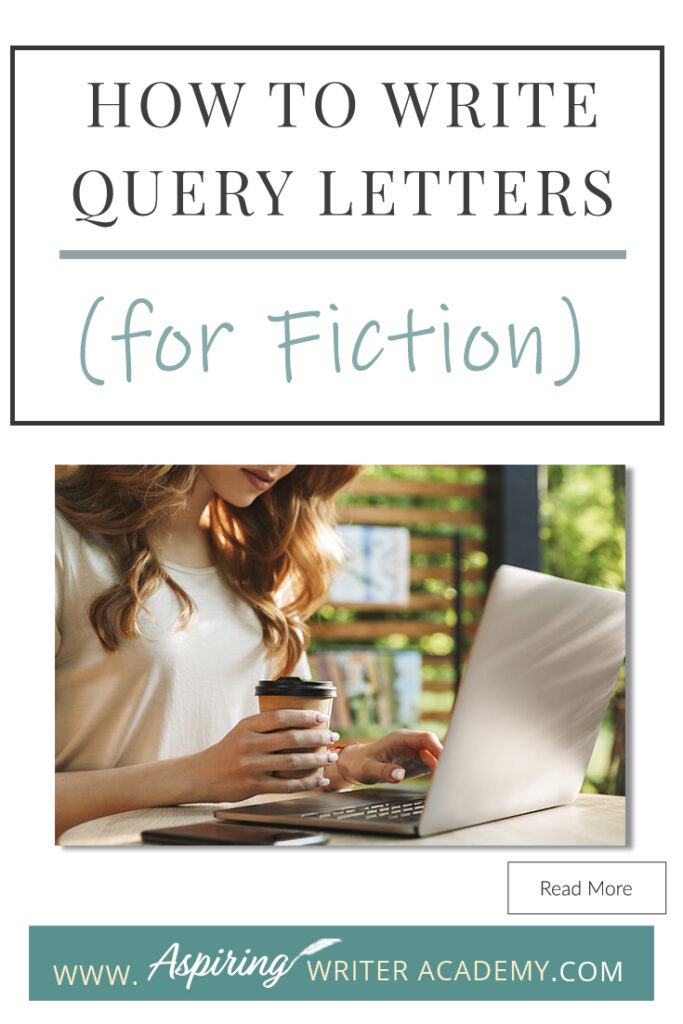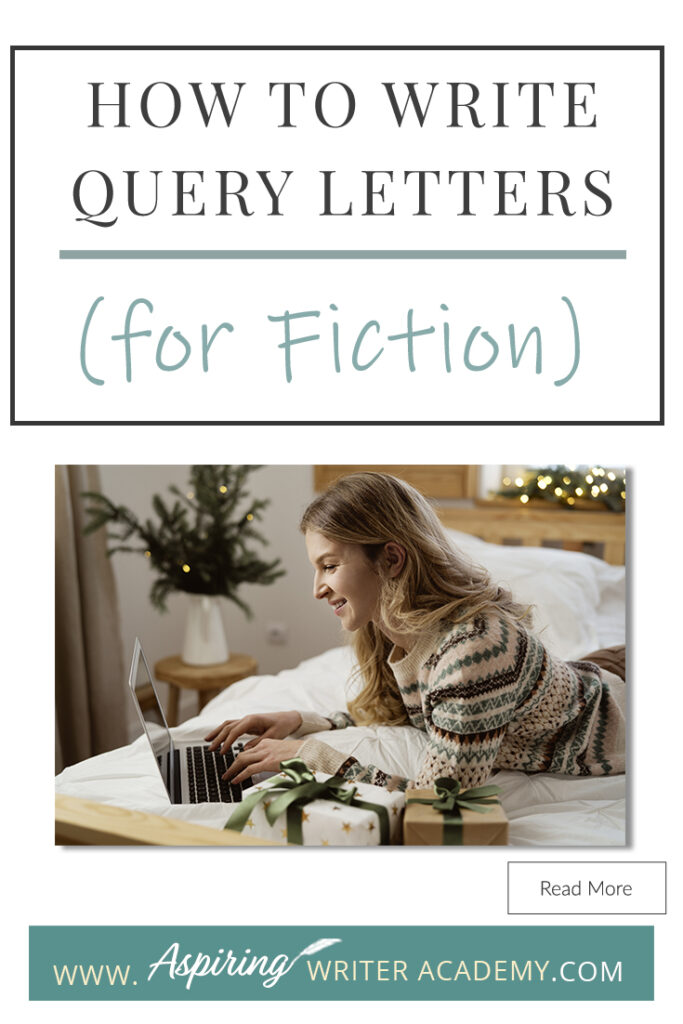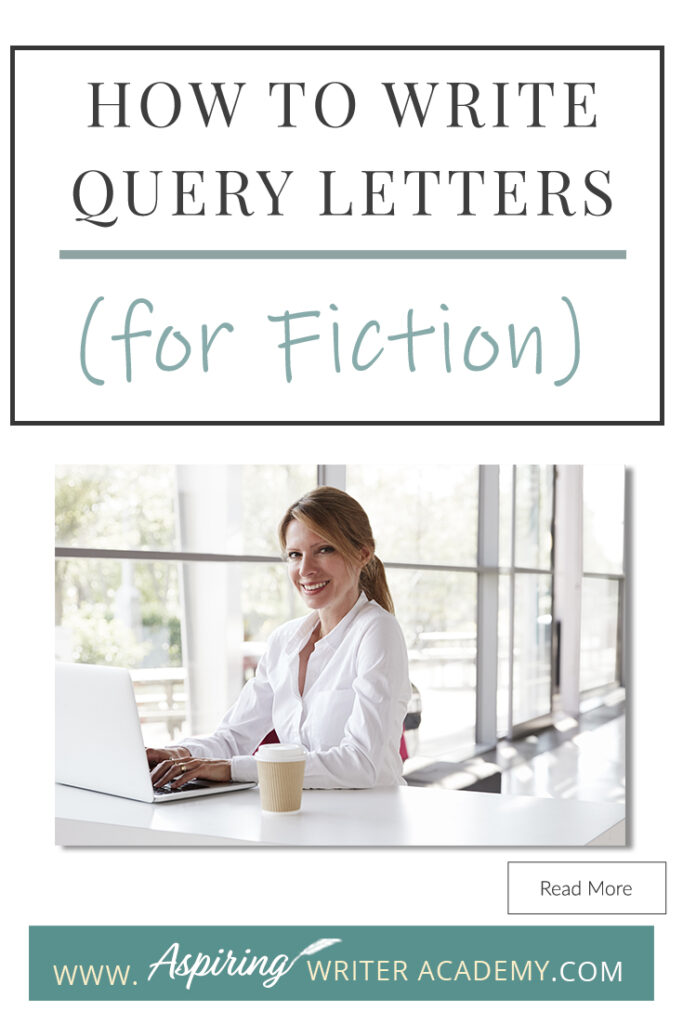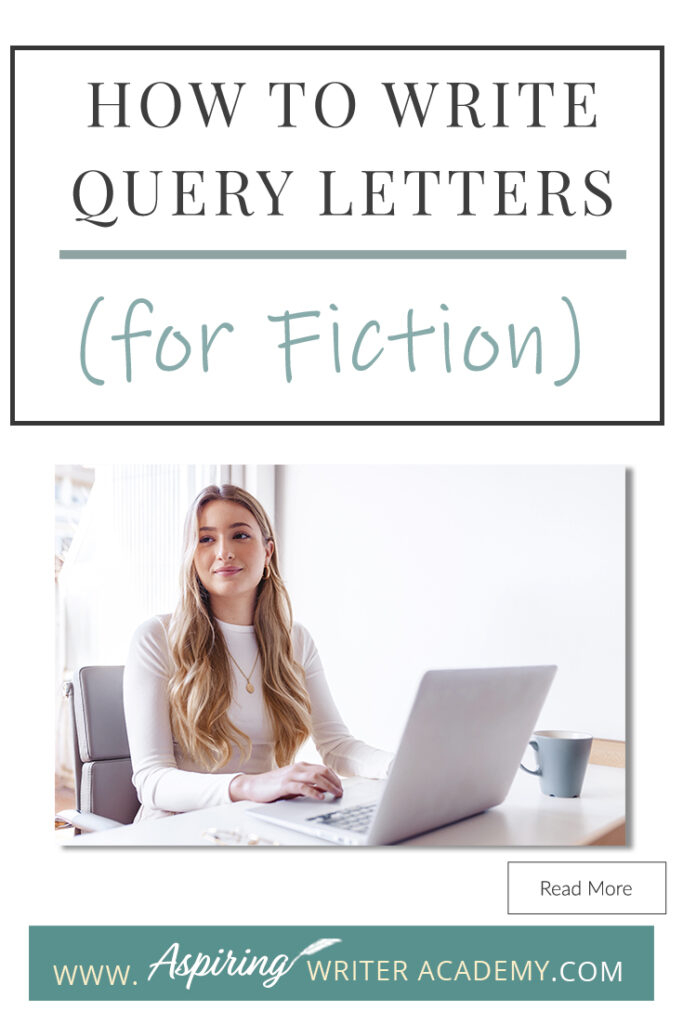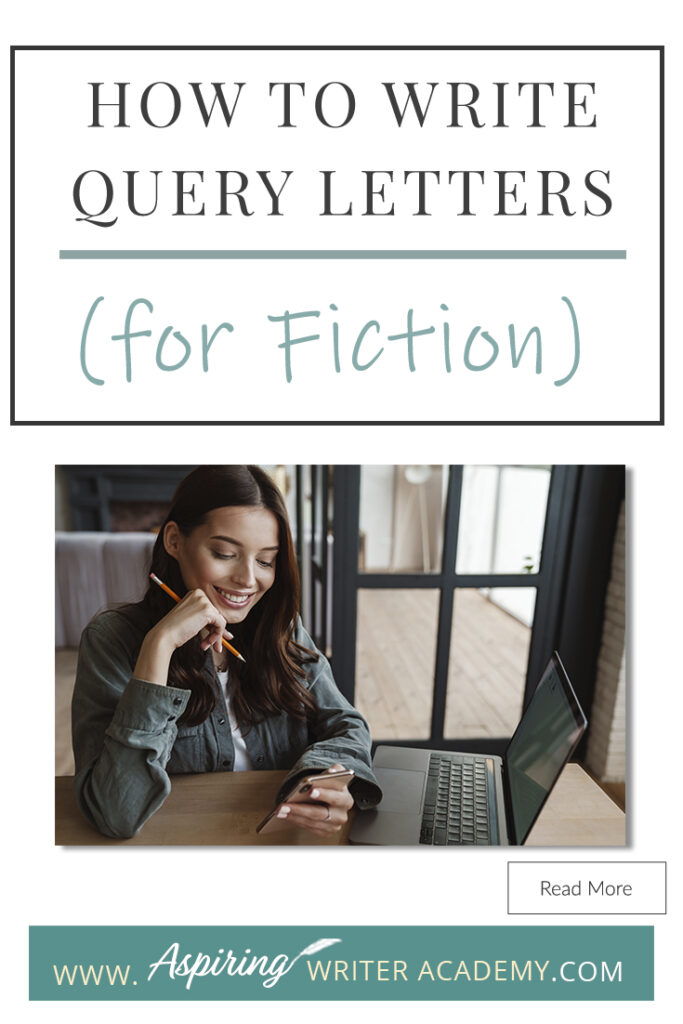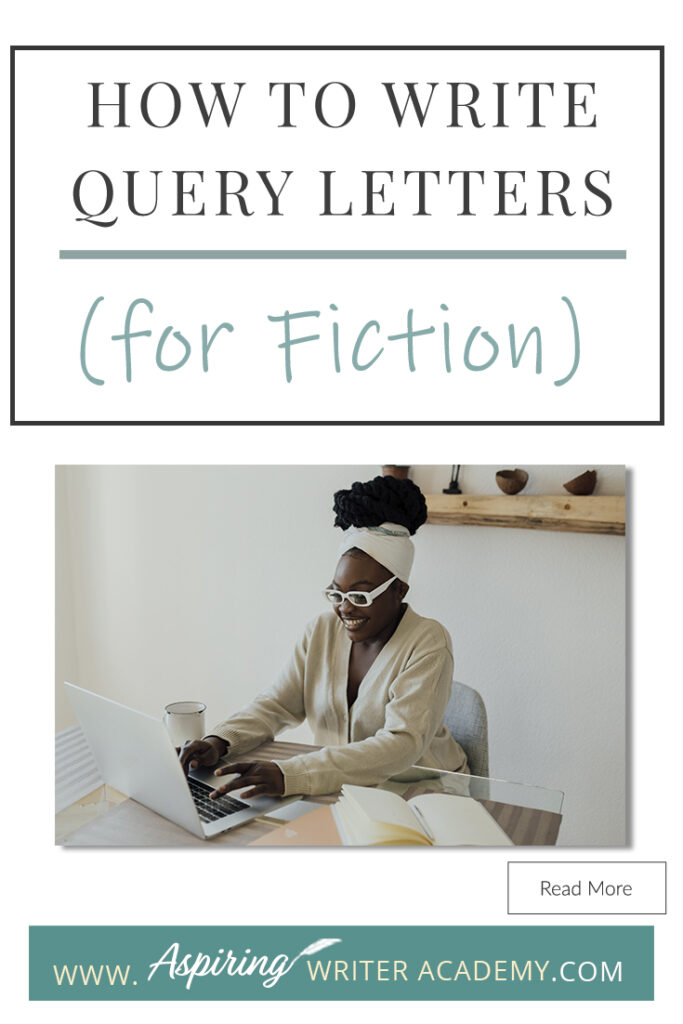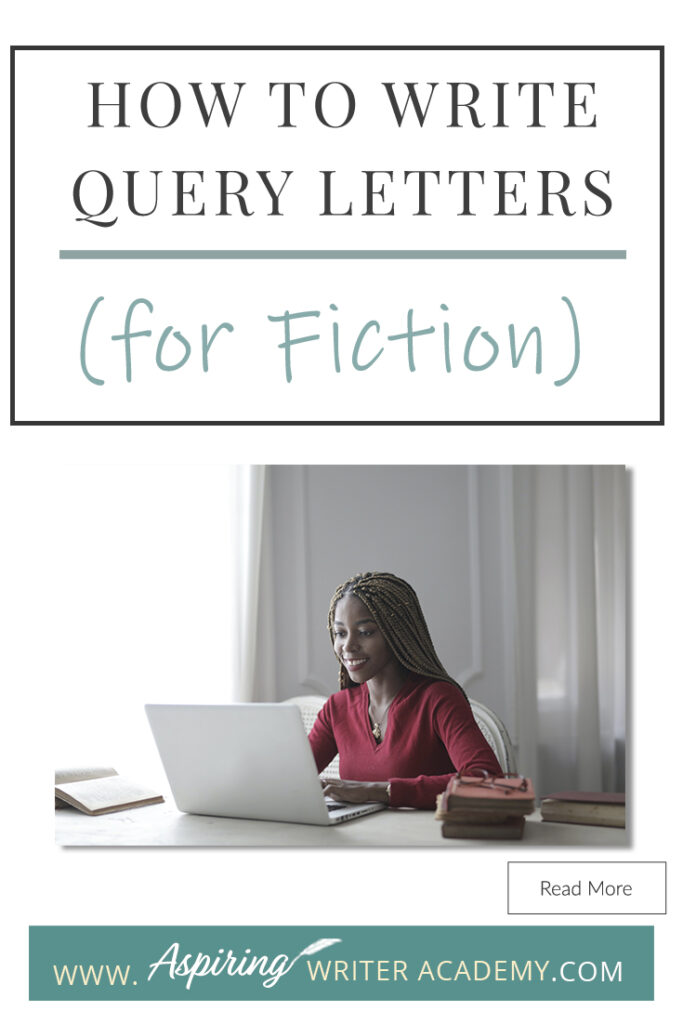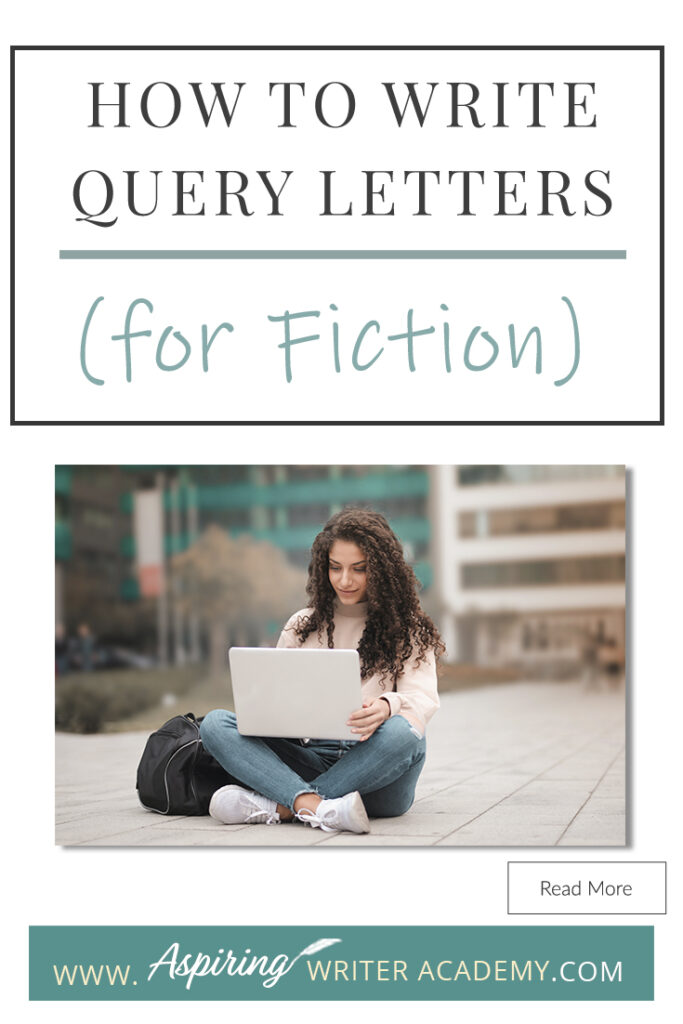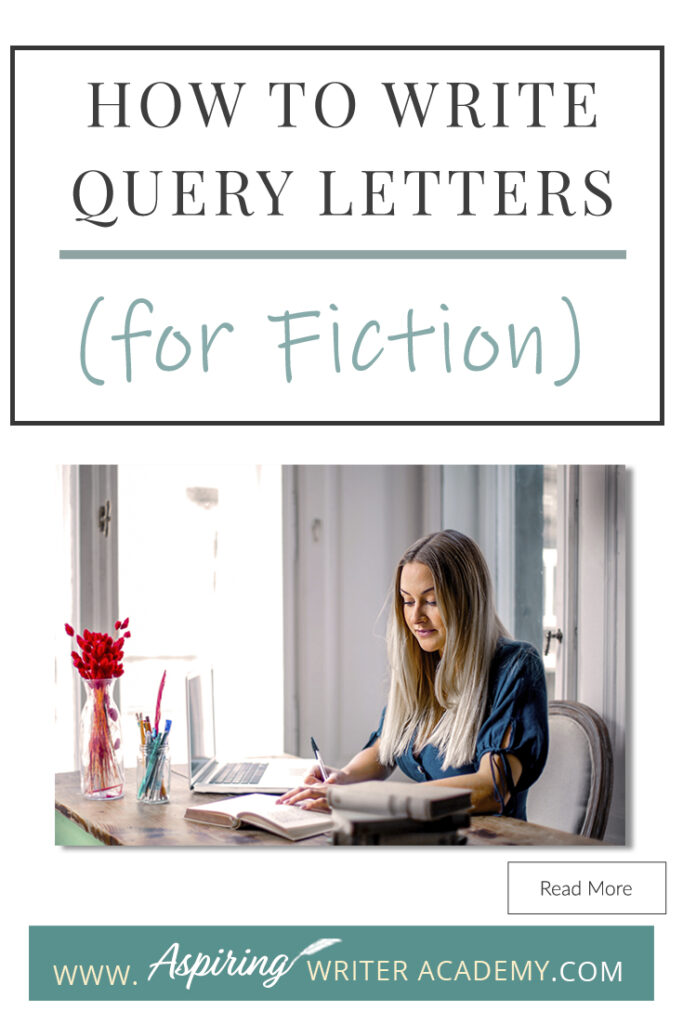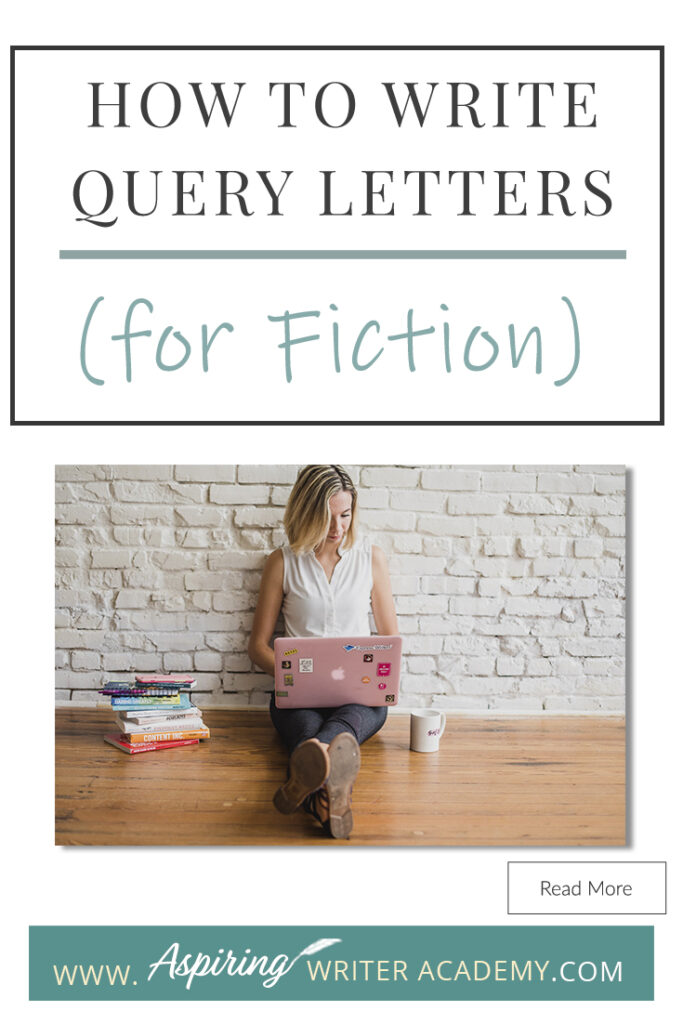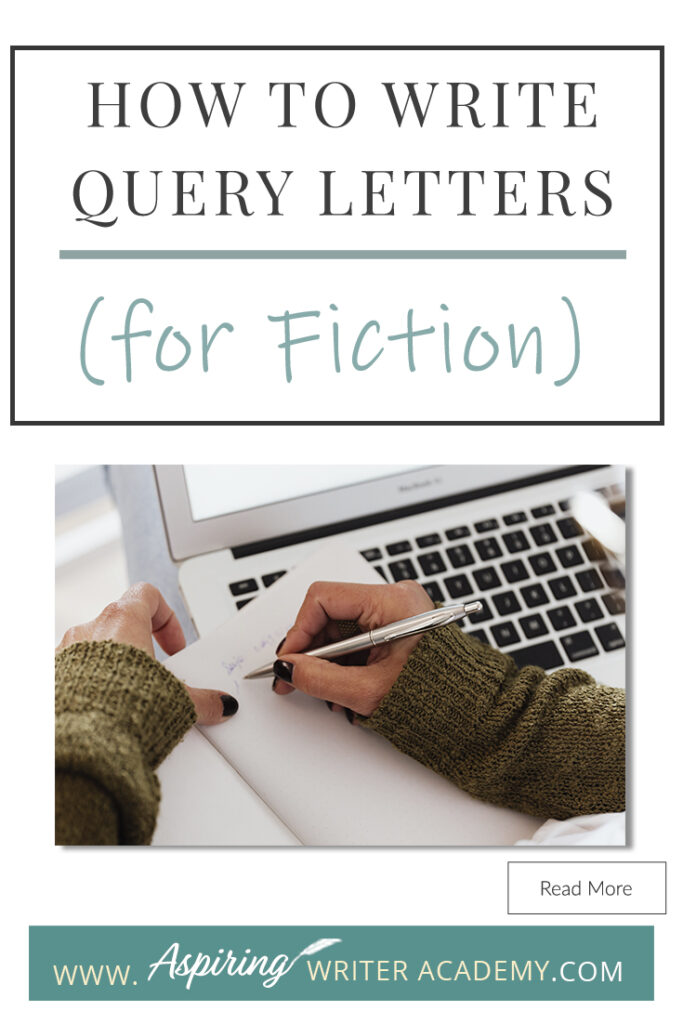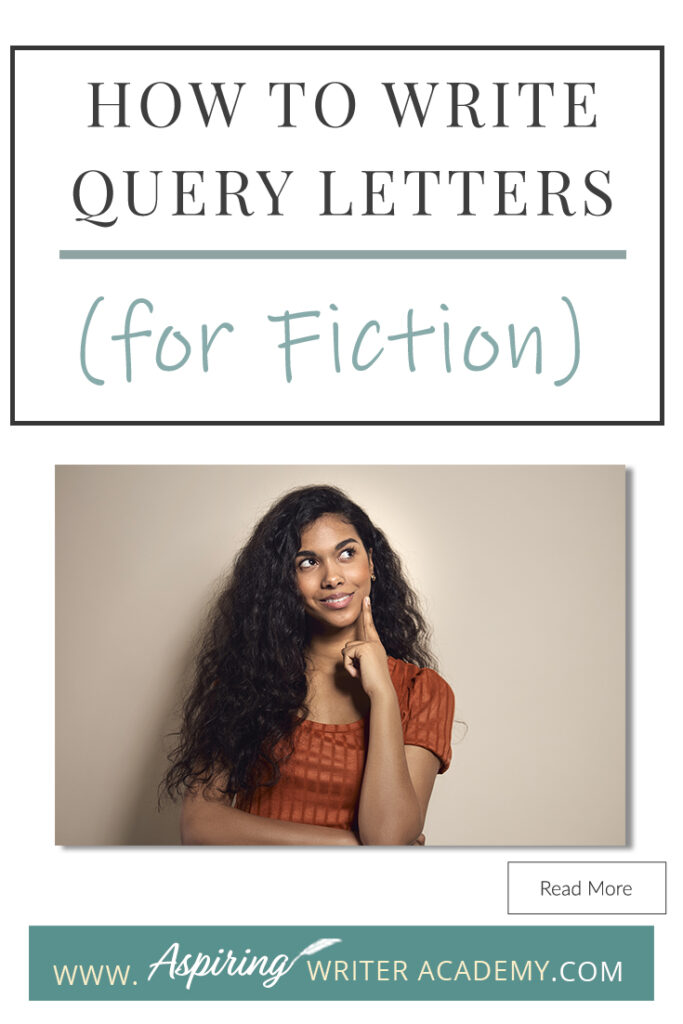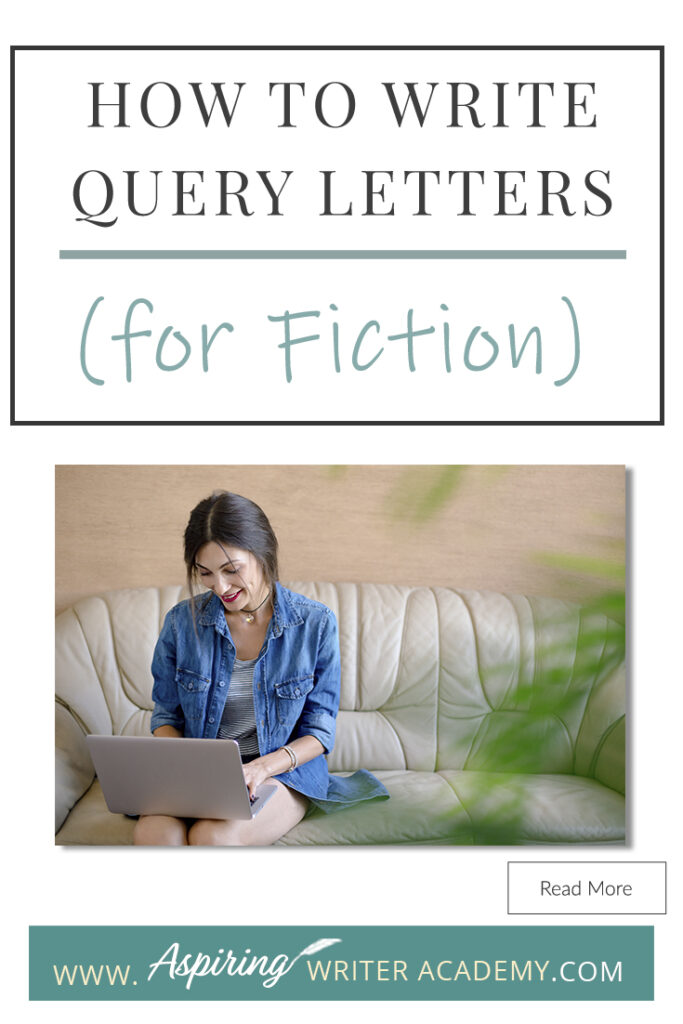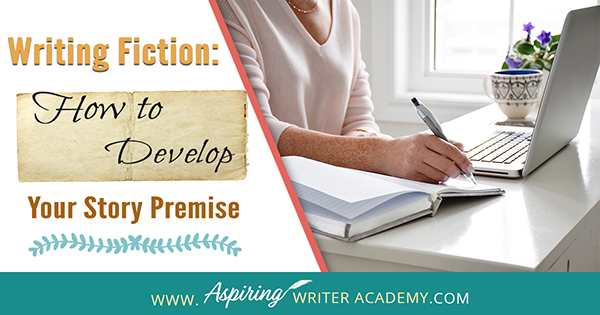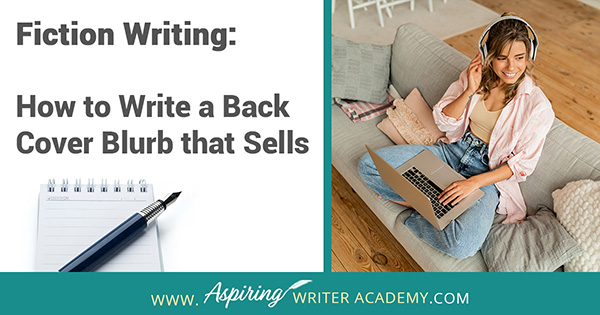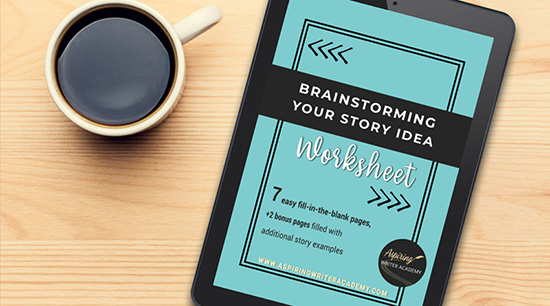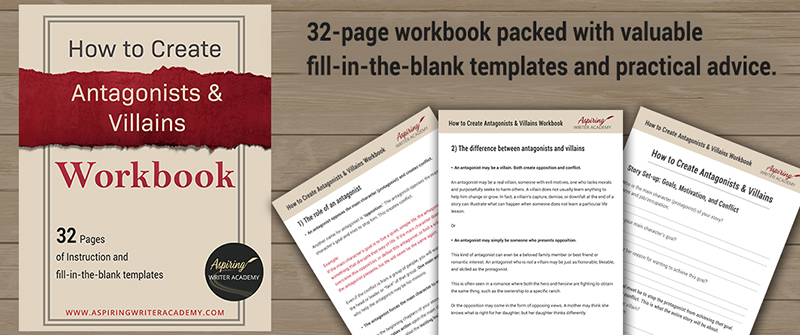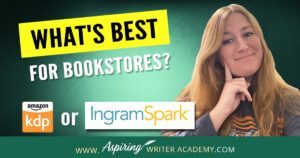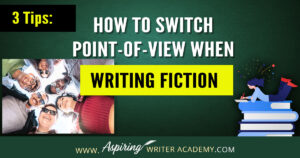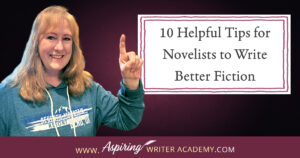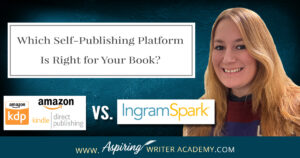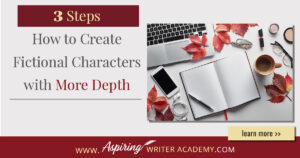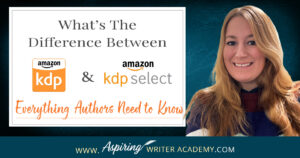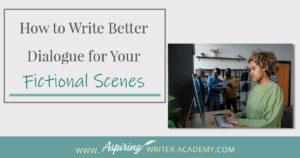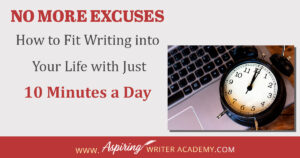How to Write Query Letters (for Fiction)
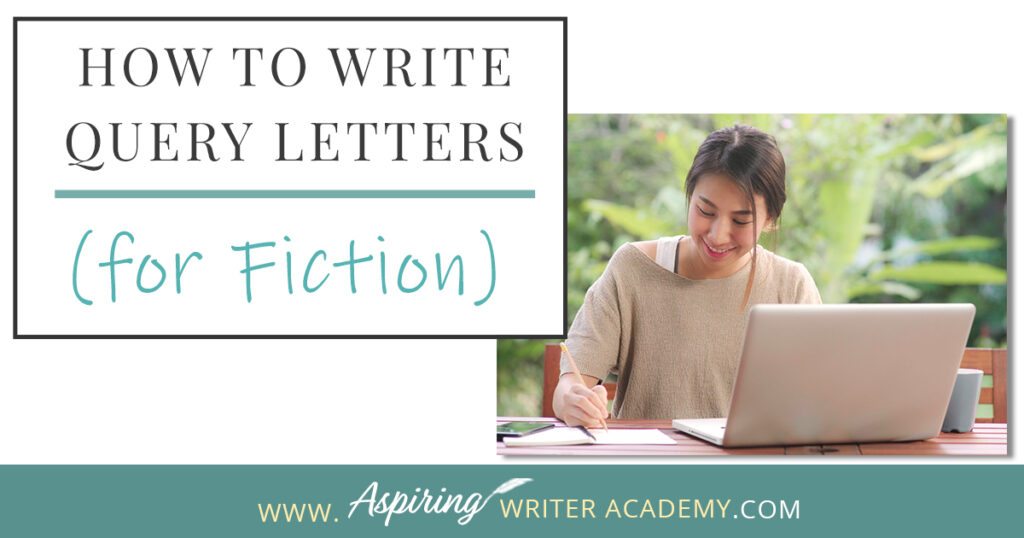
Do you have a finished novel? Are you interested in pitching your story idea to an agent or editor? The first step is to put together a query letter, the first part of your book proposal. But what goes into a query letter? Do you include a back cover blurb? A list of comparable books?
In How to Write a Query Letter (for Fiction), we discuss line by line each part of a query letter for your best chance of attracting the attention your novel deserves.
In the post below we will discuss:
- Email Subject Lines
- Greeting and Opening lines
- Introducing Your Story
- Relevant info, Qualifications
- Ask for the Sale & Thank You
- Bio, Headshot, Contact Info
- Expected Response Time
The number one rule to remember when emailing agents and editors is to follow their submission guidelines.
These guidelines can be found on their website or perhaps you may need to do a Google search. Sometimes agents and editors will discuss their submission guidelines on social media, during online interviews, or in blog posts. Each agent or editor may prefer a different style or format for submissions, and they want to see how well you follow directions.
- In most cases, the required font is 12-point Times New Roman or Courier New. Do not use color, graphic images, or any type of background. Do not use page numbers. A query is supposed to be just one page. (Just a few paragraphs long.)
- Formatting: Left – Justify your text in the body of the query.
- Do not indent your paragraphs.
- Use ALL CAPS for your title in the body of the query letter but do not use caps for the character’s names or anything else or it’s too distracting. You may also consider italicizing YOUR BOOK TITLE.
- Single space everything but double space between paragraphs.
-
Email Subject Lines
In the email subject line, you will want to start with the word ‘Query.’ This tells the agent or editor right up front that this is a query letter and distinguishes it from junk mail and the thousands of other emails they receive.
Second, you will want to place the title of your manuscript. You can use all caps for your title but do not have to. (Again, see the agent/editor’s guidelines.) You can also use a colon or a slant line between the word ‘Query’ and your title.
Example:
Query: TITLE OF YOUR BOOK
Query / TITLE OF YOUR BOOK
If your title is not too long, you may also want to add the genre in which you are writing.
Example:
Query / TITLE OF YOUR BOOK / Historical Fiction
And if you were lucky enough to meet this agent or editor in person at a conference, event, or during an online pitch fest, and they requested that you send them a query letter, then definitely add the name of the event in the subject line so that the agent or editor knows that they have met you.
This can get your query read far faster than those waiting in the rest of the ‘slush pile.’ It is always a bonus to meet the agent or editor in person whenever possible. Make sure to seize those opportunities at conferences!
Example:
Query / TITLE OF YOUR BOOK / Name of Conference
Query / THE WIZARD OF OZ / Emerald City Writers Conference (or ECWC)
-
Greeting and Opening lines
In the body of your email, you will want to begin by greeting the respective agent or editor whom you are sending the query by name. Also identify their gender by politely using Mr. or Ms.
Example:
Dear Mr. Bailey:
Or
Dear Ms. Carter:
Do NOT put ‘Dear Agent.’ You must do your research for the agency or publishing house that you are interested in and find out who actively acquires manuscripts in your specific genre or category of writing. Address a specific person.
And make sure to use ‘Dear________’ instead of an informal or cutesy ‘Hi’ or ‘Hello’ or ‘Hey!’ or ‘Howdy!’
This is a business letter. Keep it professional.
Use a colon (:) after their name instead of a comma.
-
Introducing Your Story
After the greeting, it is important to remind the agent or editor if / where / when you have met before, if indeed you have.
Example:
Dear Ms. Carter:
It was wonderful to meet you at the Emerald City Writers Conference this past May in Seattle. I enjoyed our impromptu talk about knitting in pajamas at the breakfast table as well as our discussion of my 90,000-word historical novel titled, (TITLE OF BOOK.)
Another Example:
Dear Ms. Carter:
It was wonderful to hear your keynote address at the Emerald City Writers Conference. I especially enjoyed your thoughts on ‘plotting.’ Although we did not have a chance to speak, I thank you for inviting everyone in attendance to send a query letter for your consideration.
If you have not met the agent or editor, you might want to show him or her that you have researched their agency or publishing house by stating why you are impressed with their company or why you would like to work with them.
For example, you might say that you are very fond of the quality of books from their other authors, or that you absolutely love the publishing house’s book covers because of their attention to detail.
You do not need a paragraph, just a simple line will do. After all, a query letter should be brief and to the point as much as possible.
The NEXT LINE introduces your story.
Your title, the genre, the setting, and the wordcount.
Example:
My 75,000-word sweet contemporary romance, MONTANA HEARTS, is set in the fictional town of Fox Creek, close to the real-life northern entrance of Yellowstone National Park.
Or
My novel, MONTANA HEARTS, is a 75,000-word sweet contemporary romance set in the fictional town of Fox Creek, not far from the rea-life northern entrance of Yellowstone National Park.
You can list the computer-generated wordcount at the top right of the body of the email and again in this line. Just make it CLEAR, so that the agent/editor knows (at a glance) the manuscript’s intended length. This lets the agent/editor know that you are familiar with the genre and their submission guidelines.
YOUR HOOK (OR SALES PITCH):
The next line or two will be the hook-line, one-liner sales pitch, or “30 second elevator pitch.” Even if you already gave this short pitch summarizing your story at a conference, you will need to state it again in the query letter.
What is your book about?
You will want to name the characters, their goals, and the story-worthy problem. Who (or what) is opposing your main character? What are the stakes?
Example: (from THE CUPCAKE DIARIES: SPOONFUL OF CHRISTMAS by Darlene Panzera
Andi, Rachel, and Kim each have their own reasons for wanting this Christmas at Creative Cupcakes to be special. What they didn’t count on was having a modern-day Grinch try to steal Christmas away from them. Can they unmask the culprit before it’s too late… or will this be a Christmas to remember for all the wrong reasons?
If you are not sure how to write a sales pitch, you may want to check out our blog post below:
https://www.aspiringwriteracademy.com/writing-fiction-how-to-develop-your-story-premise/
Another Example: (from THE SONG OF HEARTS SET FREE by Darlene Panzera, part of THE UNDERGROUND BRIDES COLLECTION)
In 1850, Annie Morrison, a budding Jersey City abolitionist, falls in love with Isaiah Hawkins, a handsome ferry dock worker who helps her transport slaves across the Hudson River to New York. But when she sees him aid notorious slave catcher, Simon Cole, the man threatening her family, old fears of betrayal rise up to haunt her and she must question—is Isaiah really friend or foe?
You may also want to add a quick reference the agent/editor can visualize such as:
‘TITLE OF BOOK’ is a cross between (other similar book or movie) and (another similar book or movie).
Example: A cross between JAWS and THE HUNGER GAMES.
Or you may want to just let your one-line pitch of your story stand on its own without getting too wrapped up in comparisons. (Don’t make it sound cheesy!) A comparison can grab an agent or editor’s attention, but it must be good. Try it out on several of your friends before using it in a query letter. The key is to spark their interest and make them sit up and say, “Oooh!”
If your hook or sales pitch is very short, (which it should be), you may now want to take the premise of your story a little deeper in the following paragraphs. Give the agent or editor a few more details in a brief story summary. Or give them the back cover blurb.
Back Cover Blurb: (Mini Synopsis)
While the short hook line is intended to gain the agent or editor’s interest, the back cover blurb takes them deeper into the story in a 3-paragraph segment that is meant to sell the story.
If you are proposing a series, you may want to give an overall series hook line or one-line teaser, which tells what the series is about, then give a short pitch for each book in the series. Or you may want to give the mini synopsis for the first book only and say, ‘This is the first in a planned series.’
Note:
This should be a brief mini synopsis. Short and sweet. If the agent or editor is interested in your story after they read the query letter, then they will ask you to send a 2–6-page full synopsis detailing each major plot point. But there is no room for that here.
Introduce your story and in as few sentences as possible, (that are as gripping and engaging as possible) answer the question: what is this book about?
https://www.aspiringwriteracademy.com/fiction-writing-how-to-write-a-back-cover-blurb-that-sells/
-
Relevant Info, Qualifications
If you have special expertise in the same field as your hero, or if you have an experience or special knowledge pertaining to a key component of the plot, you may want to mention this after you have presented the mini synopsis.
Example:
If the heroine in your story overcomes her story-worthy problem by poisoning the villain at the climax with a drink containing a mix of chemical compounds, and you are a chemistry lab teacher, or work in a chemistry lab, this may convince the agent or editor that you can write with enough detail to make this type of story believable to readers.
Or
If your story is about a dog breeder, and you yourself also breed dogs, this information builds credibility that you have the knowledge to write about this subject.
Who might this story appeal to? Other dog breeders? Or readers who love dogs? Dog clubs across the globe? Why specifically might they find this story appealing?
Again, keep this information to only one line or two.
Contest Wins, Recognition, or Awards:
If you won a contest or are a contest or award finalist for the piece you are submitting, be sure to list that here as well.
Note:
You do not have to list comparable books (stories similar to yours) or present a detailed promotion plan in a query letter, although you may be requested to submit these items later on with a full book proposal.
-
Ask for the Sale & Thank You
If you are sending the query letter to the editor of a publishing house, you will want to ask for the sale, thank the editor, and sign off.
Example:
I hope you will consider, (TITLE OF YOUR BOOK), for publication. Thank you for your time and attention. I look forward to hearing from you.
Or simply:
Thank you for your consideration.
If you are sending to an agent, you might want to reword this a little different.
Example:
I hope you will consider representing (TITLE OF YOUR BOOK). Thank you for your time and attention.
Or
Thank you for your consideration.
(The agent knows you are seeking representation just by sending the email.)
Do not carry on or beg.
Avoid commenting on the quality of your work. That is for the agent or editor to decide. Do not include the praise given to your book from your friend or grandmother.
Do not state that you are simultaneously querying other agents or editors unless their guidelines request you do so.
-
Bio, Headshot, Contact Information
At the bottom of your query, you will want to include your name (email signature), a professional bio listing your publishing credentials, along with a professional author headshot photo, and your contact information.
If you are unpublished and do not have any contest wins to your credit, you can list your membership in professional writing organizations in your bio to show you take your writing seriously. Which groups do you belong to?
Finally, do not forget to list your contact information and list your social media links.
Example:
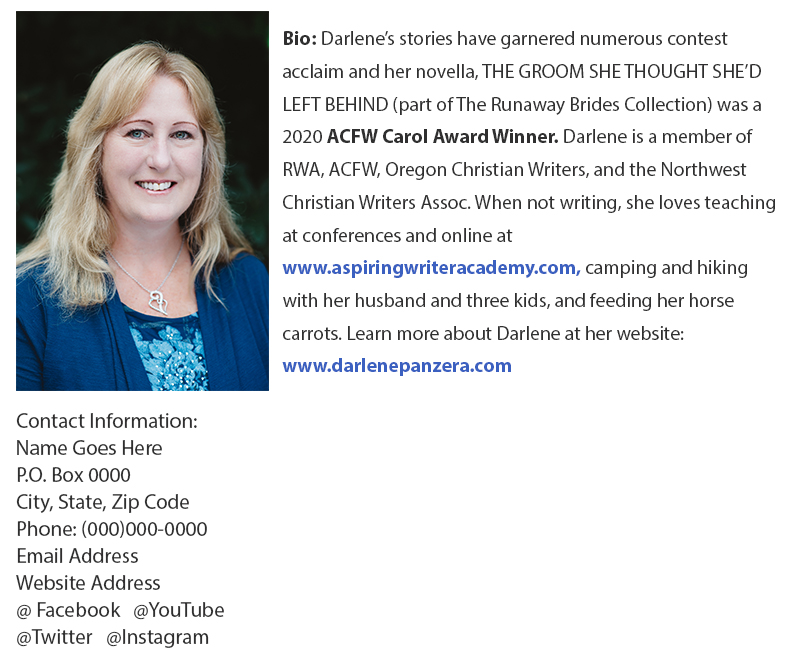
-
Expected Response Time
Agents:
When can you expect to hear back from a query letter to a literary agent?
This can vary. The benefit of meeting an agent (or editor) in person is that you can ask them this question directly before submitting. Some agents will tell you that their inbox is swamped, and they will not respond for 3 months.
Some agents respond within 2-4 weeks and if it goes beyond 6 weeks and you haven’t heard back, it most likely means they are not interested in representing your work. Of course, there is always the chance your query got lost in their email, so after 6 weeks, it wouldn’t hurt to follow up with a polite inquiry.
Agents usually respond quicker than the editors of a publishing house.
Editors:
The response time from editors could be anywhere from 3-6 months, sometimes up to a year. If you already have an agent, the wait time is usually shorter. And sometimes, it just depends on what is laying on the editor’s desk or sent to the editor that particular day. By chance, you may hear back within a week, although most authors need to wait…and wait.
However, be warned: Not all agents and editors will respond to a query letter.
If you haven’t heard back within 3 months, you may want to send a follow-up email to make sure they received your query and politely ask when you should expect a response.
If you still do not receive a response, consider it a pass. They are not interested.
We hope you have enjoyed How to Write a Query Letter (for Fiction) and that you have gained some valuable tips to write a fabulous query letter to send to agents and editors that may land you a book contract for your fictional novel.
If you have any questions or would like to leave a comment below, we would love to hear from you!
And if you would like additional help developing your story idea, we invite you to download our Free Brainstorming Your Story Idea Worksheet.
Do you find it difficult to create compelling antagonists and villains for your stories? Do your villains feel cartoonish and unbelievable? Do they lack motivation or a specific game plan? Discover the secrets to crafting villains that will stick with your readers long after they finish your story, with our How to Create Antagonists & Villains Workbook.
This 32-page instructional workbook is packed with valuable fill-in-the-blank templates and practical advice to help you create memorable and effective antagonists and villains. Whether you're a seasoned writer or just starting out, this workbook will take your writing to the next level.
Our Goal for Aspiring Writer Academy is to help people learn how to write quality fiction, teach them to publish and promote their work, and to give them the necessary tools to pursue a writing career.
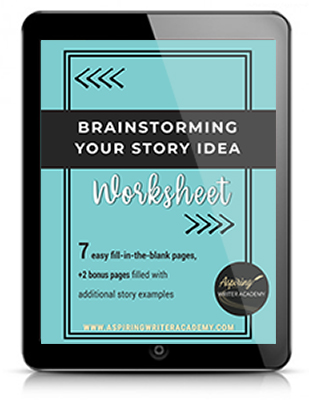
ENTER YOUR EMAIL BELOW
TO GET YOUR FREE
"Brainstorming Your Story Idea Worksheet"
7 easy fill-in-the-blank pages,
+ 2 bonus pages filled with additional story examples.
A valuable tool to develop story plots again and again.
Other Blog Posts You May Like
Slingshot Week: How to Set New Goals for Writing in 2023
The Pros and Cons of Writing Holiday Fiction (Collections & Anthologies)
Biggest Self-Publishing Mistakes New Authors Make
Novel Writing Tips: Don’t Bury the Dialogue!
What to Include in Your Author Newsletter
How to Choose Characters to Populate Your Fictional Story
Why Authors Need an Email Newsletter
Fiction Writing: Critique Group Etiquette & Warning Signs of a Good Group Gone Bad
How to Prep for NaNoWriMo (National Novel Writing Month)
Fiction Writing: How to Plot a Story where the Antagonist is an ‘Invisible Foe’
What Authors Need to Know About ISBN Numbers Before Self-Publishing
Fiction Writing: How to Find a Critique Partner/Group
How to Research Information for a Historical Novel
7 Steps to Begin Writing a New Fictional Story
Learn to Plot Fiction Writing Series: Story Analysis of the movie “Signs”
Fiction Writing: How to Get a Literary Agent
How Writing Prompts Can Improve Your Fictional Story
Creative Writing: 5 Ways to Strengthen a Weak Fictional Character
Fiction Writing: Create a Storyboard to Map Out Your Scenes
Fiction Writing: How Specific Details Can Bring Your Setting to Life

is a multi-published author, speaker, and writing coach. She writes sweet contemporary, inspirational, and historical romance and loves teaching aspiring writers how to write quality fiction. Read her inspiring story of how she published her first book and launched a successful writing career.
